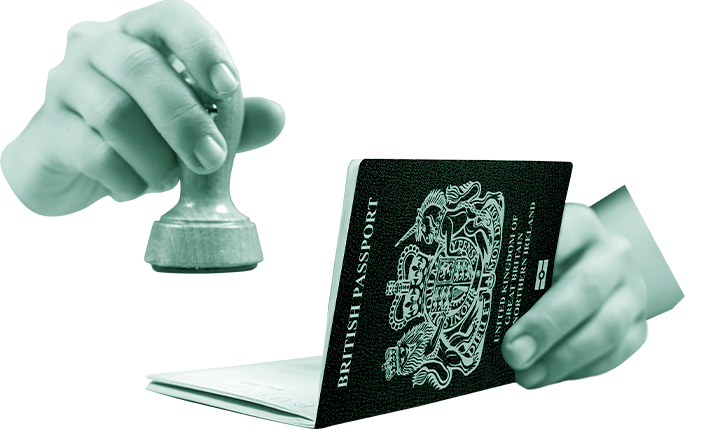Let's Talk

Need Help Urgently?
Call our 24 hour rapid response team now on 0333 311 1090
Request a callback
"*" indicates required fields


Navigating the UK immigration system can feel complicated. However, for senior workers and specialists wanting to move to a UK branch of their company, the Senior or Specialist Worker visa makes it easier. This worker visa, part of the Global Business Mobility scheme, aims to bring in skilled workers and help businesses in the UK. This guide gives a complete overview of this visa.
The Senior or Specialist Worker visa is a UK visa. It helps experienced professionals and highly skilled workers move from a company in another country to a UK branch or subsidiary. This visa is now part of the UK’s Global Business Mobility routes. It replaced the old Intra-Company Transfer (ICT) visa.
This visa is for temporary work assignments. It allows businesses to use their workers’ skills for special projects or to fill important roles in their UK operations. This visa is designed to meet the mobility needs of today’s businesses in a global economy.
The Senior or Specialist Worker visa falls under the UK’s Global Business Mobility rules. This visa was created after Brexit to replace the old Intra-Company Transfer (ICT) visa. It makes it easier for multinational companies to send their existing workers to their UK offices.
The Specialist Worker visa is for senior managers and specialists who have certain skills and experience. This visa allows UK businesses to move key staff for projects that need special knowledge. It also helps companies work better together across different countries.
This policy shows that the UK wants to attract businesses and talent. It supports new ideas and helps the economy grow. Also, these temporary assignments can help businesses share knowledge, work together better, and strengthen their presence in the UK.

The Senior or Specialist Worker route plays an important role in UK immigration. It supports the government’s aim to bring in businesses and skilled people to help the UK economy. This category shows a change in UK immigration policy toward a points-based system that values skills and experience.
As part of the Global Business Mobility scheme, this visa route makes the UK appealing for big companies. It helps by making it easier to transfer employees. This way, the UK encourages businesses to set up, invest, and create new ideas.
This visa route shows the government’s dedication to supporting business mobility in today’s global market. It also helps to attract skilled workers for specific jobs in the UK. This method makes the UK more competitive worldwide and highlights a selective immigration system.
Applying for a Senior or Specialist Worker Visa has certain requirements. You must be an employee of a company based overseas that has a branch or subsidiary in the UK. You also need to have a job offer in an eligible occupation. The UK company must have a valid sponsor licence.
Besides these sponsorship and job requirements, you must show that you can support yourself financially while you are in the UK. You need to meet the minimum salary levels too. If you need it, you should provide a recent TB test result. Meeting all these criteria is important for a successful application.
For a successful Senior or Specialist Worker visa application, the job you are offered must qualify under this category. Not every job fits for this visa route. Applicants must show that their role meets the UK’s needs for skills. You can find a full list of eligible jobs with their unique occupation codes on the UK government’s website.
The applicant’s role in their company overseas is also very important. This visa is mainly for senior managers or specialists. Applicants must prove their role meets these requirements. They should highlight their work experience and skills. This ensures that the visa is used as intended, which is to help people with specific skills and leadership experience move to the UK.
It is also important to remember that the Senior or Specialist Worker visa and the Skilled Worker visa are both UK work visas, but they are for different types of applicants and jobs. It is crucial to understand the details of each category and what they require. This will help you choose the right visa route for your situation.
A key requirement for the Senior or Specialist Worker visa is getting sponsorship from a UK company. This company is usually a branch or part of the applicant’s overseas employer. The company must have a valid sponsor licence from the Home Office. This licence allows them to hire foreign workers.
The sponsor company will give a Certificate of Sponsorship (CoS) to the applicant. This certificate confirms the job offer and includes important details about the job, like the salary and occupation code. The CoS is unique to the applicant and has a specific reference number which is important for the visa application.
Getting a valid certificate of sponsorship is a crucial step. It shows that the job offer is real and confirms if the applicant meets the requirements for this visa type. The CoS is necessary for the applicant to move forward with their visa application.
Successfully handling the visa application process takes careful planning. First, check if you meet the requirements and get a valid Certificate of Sponsorship from your sponsoring company. Then, gather all the important documents. These include a valid passport, proof of your financial situation, and records of your work with your overseas employer.
It is also important to know about the costs related to the visa. This means paying the visa application fee and the Immigration Health Surcharge (IHS) to use the UK’s National Health Service (NHS). You also need to show that you have enough money to support yourself during the first few months of your stay.
Collating the necessary documents is an important step in applying for a visa. A well-organized application with all the proper paperwork can help ensure a smooth decision. The specific documents may differ based on personal situations, but here’s a general checklist to follow:
Identity Documents:
Certificate of Sponsorship:
Financial Evidence:
Employment History:
Additional Documents:
Also, remember that any documents not originally in English or Welsh must come with a certified translation. It’s very important to provide clear and accurate electronic documents during the visa application process.
Meeting the financial requirement is very important for a successful Senior or Specialist Worker visa application. Applicants must show that they can support themselves without needing public funds while living in the UK. These rules help make sure individuals can take care of themselves and their families without affecting the UK’s social support system.
The financial requirement includes two key parts: the minimum annual salary and maintenance funds. The Certificate of Sponsorship (CoS) states that the annual salary must be at least the minimum salary for the job code listed. Applicants may need to provide proof of their earnings using recent payslips and, if needed, their job contract.
Besides showing a good salary, applicants usually must show they have at least £1,270 in their bank account for 28 days in a row. This shows they can take care of themselves when they arrive in the UK. The amount needed can be higher for those moving with family members.

Applying for a Senior or Specialist Worker Visa has several steps. First, check if you are eligible and gather all your documents. Then, start your application online.
You will need to create an account on the UK government’s official website. After that, fill out the application form, pay the fees, and schedule an appointment at a visa application centre.
At your appointment, you will give your biometric information, which includes fingerprints and a photo. Finally, you will have to wait for a decision from the Home Office regarding your visa application. Each part of this process is important and needs careful attention.
Step 1: Obtain a Certificate of Sponsorship
The first step to get your Senior or Specialist Worker visa is to get a valid Certificate of Sponsorship (CoS). This certificate is given by your sponsoring company, which must have a valid sponsor licence. The CoS confirms your job offer in the UK. It includes important details like your role, salary, and how long you will work.
The CoS is not just a form you fill out. It is crucial for your visa application. If you do not have a valid CoS, your application will be rejected. Remember, the CoS has an expiry date. You must submit your visa application within three months after receiving it.
After your sponsoring company gives you the CoS, check that all the information is correct. Pay close attention to your name, date of birth, passport details, occupation code, and when your job starts. Any mistakes could cause delays or even refusals of your visa.
Step 2: Complete the Online Application Form
Once you get your CoS, the next step is to fill out the online application form. This form is important for your UK visa application. It asks for details about you, your job history, your travel plans, and what you want to do in the UK. It’s very important to fill this out accurately and honestly.
The online application is easy to use. It will guide you through each part with clear instructions. The form covers a lot of areas like your personal information, contact details, family information, education, work background, and travel history.
Make sure you take enough time to fill out the form correctly. If you rush, you might make mistakes or forget to add some information. Incorrect details can slow down the process or even cause your application to be denied.
Step 3: Compile the Necessary Supporting Documents
Submitting supporting documents with your online application is very important. These documents help check the information you provided and make your case stronger. They serve as proof to back up your claims and add trust to your specialist worker visa application.
Look at your checklist before you send your online application. Make sure you have all the needed documents ready. This usually means you’ll need your passport, CoS, financial statements, employment records, and other papers that are important for your situation.
Organize your documents well. This helps the Home Office review your application more easily. Label each document clearly and make sure it is readable. Uploading clear and complete electronic documents is key for a smooth application process.
Step 4: Pay the Visa Fee and Healthcare Surcharge
Upon sending in your online application form and supporting documents, the next step is to pay the visa application fees. These fees are needed to process your application and are not refundable, no matter what happens with your application. So, it’s very important to make sure you are applying for the right visa and that you meet all the eligibility criteria.
The visa application fee can change based on your nationality and whether you’re applying from inside or outside the UK. You also need to pay the Immigration Health Surcharge (IHS). This charge gives you access to the UK’s National Health Service (NHS) while you are there.
The IHS fee also changes depending on the type of visa and how long you will stay. If you do not pay the IHS along with your visa application fee, it can delay the process. So, make sure to consider both costs when applying.
Step 5: Attend Your Biometric Appointment
After you submit your online application and pay the fees, you must set up an appointment at a visa application centre (VAC) to give your biometric information. These centres are located in different countries and are approved by the Home Office to collect biometric data from people applying for a visa.
At your appointment, they will take your fingerprints and a photograph. This will help create your unique biometric record. This step is normal for most UK visa applications. It helps to accurately identify people entering the country.
Don’t forget to bring your original passport and the appointment confirmation letter to the VAC. The staff there will help you with the biometric data process. This procedure is usually quick and easy. It is an important step as it registers your application with the Home Office.

Submitting your application is a big step in your visa journey. Now, you will have to wait. While waiting can feel hard, it is a good idea to use this time to get ready for your move. If your application goes through, you will get your visa. This means you can enter the UK and start your new job.
It is also important to understand what might happen next. A successful application means you can move. But if your application is refused, it’s key to think about your options. Learn about different possibilities and have a plan ready.
While waiting to hear back after you submit your visa application can feel uneasy, knowing the usual processing times can help. The time it takes for a Senior or Specialist Worker visa to get approved can change. This can depend on things like how many applications the Home Office has, your nationality, and how complex your application is.
If you apply from outside the UK, you can usually expect a decision in around 3 weeks. If you are already in the UK and are extending your visa or switching to this visa, it may take longer, usually about 8 weeks. Keep in mind that these times are just estimates, and unexpected issues can affect how long it takes.
It is a good idea to wait before making any travel plans that cost money. Making non-refundable travel plans before getting your decision can be risky due to possible delays. Checking your application status online through the Home Office portal is a smart move to stay updated.
Receiving a decision about your visa application is an important step in your journey. If your visa gets approved, congratulations! You will receive your visa, which allows you to enter the UK and start your new role. Before you travel, take time to check the details on your visa. Make sure your name, passport number, and how long you’re allowed to stay are all correct.
If your visa application is denied, don’t lose hope. A visa denial is not the end. The UK government has ways you can respond, like asking for a review or filing a new application. Before doing anything, find out why your visa was refused. The reasons are usually noted in the refusal letter.
Once you know the reasons, think about what to do next. If you feel the refusal was due to a mistake or misunderstanding, you can submit a new application that addresses those issues. It may also help to talk to an immigration lawyer who knows about UK immigration rules. They can look at your case, help you understand your options, and guide you through the process.
Understanding the rules of your Senior or Specialist Worker visa is very important. This visa sets the rules for how long you can stay and where you can work in the UK. Once you have this visa, you will have certain rights and limits that affect what you can do while you are here.
This visa mainly focuses on the job you have at the sponsoring company. It allows you to work only for that company in the job stated in your Certificate of Sponsorship (CoS). You can also do voluntary work. However, you must remember that working in a job that is not allowed or for another employer is not allowed unless you get permission from the Home Office first.
The Senior or Specialist Worker visa in the UK has specific limits on what jobs you can do. This visa only lets you work in the job you were sponsored for, as noted in your Certificate of Sponsorship (CoS). If you want to take another job without permission from the Home Office, it can break your visa rules and lead to serious problems.
If you want to work another job or freelance while you are sponsored, you must apply for a change of employment. This process is like the start of your visa application. You will need to get a new CoS from the new employer, meet the eligibility criteria, and pay any necessary fees.
It’s important to note that the Senior or Specialist Worker visa is different from the Skilled Worker visa. The Skilled Worker visa allows for a wider range of jobs in skilled occupations, while the Senior or Specialist Worker visa is only for temporary intra-company transfers. It limits work to a specific role in your sponsoring company.
One of the good things about the Senior or Specialist Worker visa is that it allows you to enter and leave the UK many times during its valid period. This gives you the freedom to go on business trips, take holidays, or visit home. However, it is important to know the details about travel and re-entry for a smooth journey.
Although the visa lets you travel, it does not guarantee that you will be allowed to come back in. UK immigration officials will check your documents, travel history, and reasons for entry each time you arrive. They can deny you entry if they think there is any problem with your visa or purpose.
Also, make sure your passport is valid for the whole time you plan to stay in the UK. If your passport is getting close to its expiration date and you plan to travel a lot, think about renewing it before you go. Keeping good records of your travel, including entry and exit stamps, can also be helpful.

The Senior or Specialist Worker visa is meant for temporary work. However, you can extend your stay in the UK if you still meet the eligibility criteria. This extension helps both people and businesses by allowing them to work on longer projects or stay involved in UK activities.
To extend your visa, you need to show that you still work for the sponsoring company. You also need to meet the minimum salary requirements and not go over the maximum time allowed for this visa. Plus, you must continue to meet any other general eligibility criteria.
Extending your Senior or Specialist Worker visa requires meeting certain rules set by UK immigration. To be eligible, you must still meet the original requirements like sponsoring, job status, and financial health. This is not an automatic extension; it’s more like a new application with different rules.
A key requirement for the visa extension is having a qualifying job. This means your role must still be on the list of eligible occupations, and your employer must be approved to sponsor this visa type. You need to show that your job is ongoing and remains close to the original terms found in your first Certificate of Sponsorship (CoS).
Your salary must still meet the minimum required for your occupation code. Plus, your sponsoring company has to confirm that they plan to keep you in a similar role. It’s important to think about how long you can stay on this visa. Extensions are allowed, but you cannot stay in the UK on this visa forever.
The application process for extending your Senior or Specialist Worker visa mirrors the initial visa application, involving completing an online application form, submitting supporting documents, paying the associated fees, and attending a biometric appointment, if required. However, applying for the extension from within the UK provides certain conveniences, such as not requiring a new CoS.
You can apply for an extension before your current visa expires. Commencing the process well in advance ensures a seamless transition and prevents inadvertently breaching your visa conditions. Aim to submit your extension application at least 8 weeks before your current visa expiry date, as the processing time might vary.
While Senior or Specialist Worker visa extensions provide a means for remaining in the UK, it’s worth noting that this visa route doesn’t offer a direct path to indefinite leave to remain (ILR), more commonly known as permanent residency. To settle permanently in the UK, exploring alternative visa categories is necessary.
| Feature | Extension (From Inside UK) |
| Application Form | Online |
| Certificate of Sponsorship | Not Required – still required for extension application. |
| Biometric Appointment | Potentially Required |
| Processing Time | Up to 8 Weeks |
| Indefinite Leave to Remain | Not Applicable |

The Senior or Specialist Worker visa is a part of the UK’s Global Business Mobility scheme. This visa helps employees move to a UK branch or subsidiary of their overseas company. It takes the place of the old UK ICT visa for temporary work. With this visa, skilled workers can share their knowledge on UK projects.
This option is meant for senior managers and specialist workers who are key to the overseas company. The visa allows them to live in the UK for a short time. During their stay, they can help the UK branch grow and succeed. This process encourages sharing knowledge and builds a stronger connection between the overseas company and its UK branch.
Holding a Senior or Specialist Worker visa lets you do the job you are sponsored for. This visa is meant for temporary work. It does not give you a direct way to get permanent residency. How long you can stay depends on your situation and what your sponsoring company needs.
This global business mobility visa also lets you travel to and from the UK while your visa is valid. This way, you can stay connected with your home country or travel for fun. It is best to stay in the UK for most of your visa time. This can help avoid any issues with immigration about your plan to go back home.
While your main job is important, this visa does allow you to take study programs in the UK. Just make sure these studies do not affect your sponsored job. This way, you can grow personally and professionally while you work.
Only companies in the UK that have permission from the Home Office and a valid sponsor licence can sponsor people for a Senior or Specialist Worker visa. The UK company needs to be a branch, subsidiary, or connected to the applicant’s foreign employer. They must show a real need for the applicant’s skills in their UK operations.
The UK company starts by applying for a sponsor licence from the Home Office. They must prove they meet the rules for hiring overseas workers. When they receive the licence, the company can give out Certificates of Sponsorship (CoS) to employees they want to bring to the UK.
It’s important to understand that just having a foreign employer with a UK presence is not enough for sponsorship. The UK sponsor has to meet the requirements for the sponsor licence. They must show they care about following UK immigration laws and protecting the rights of their sponsored workers.
To qualify for a Senior or Specialist Worker visa, applicants must meet a few main requirements. First, you need to be at least 18 years old. Next, you must have a valid job offer from a UK sponsor for an eligible job. You also have to meet the minimum salary for that job. Additionally, you need to show you can support yourself financially. If your sponsor plans to support you, they can confirm that. In some cases, you may need to provide a tuberculosis (TB) test certificate.
Basically, you must show your desire to work in the UK is real. Your job should help the UK economy. Furthermore, your presence needs to be safe for everyone and not disturb the UK’s immigration system. These rules help ensure migration is responsible and fills real skills gaps.
To get the Senior or Specialist Worker Visa in the UK, you must follow some rules from the Home Office. First, you need a valid Certificate of Sponsorship from a UK sponsor. Then, you should match the right occupation code and be offered a skilled worker job. You also have to meet the salary requirements. It is important that your job fits with the UK’s immigration rules. Depending on the type of visa you want, there may be extra requirements. Make sure to check all the eligibility criteria before you start the visa application process.
Navigating the sponsor requirements for a Senior or Specialist Worker visa is very important to a successful application. These rules focus on showing a real need for the applicant’s skills in the UK. They also check if the job offer is valid and ensure the worker’s safety.
UK sponsors of Senior or Specialist Workers must follow strict rules from the Home Office. They need to show there is a real job opening that cannot be filled by a local worker. They must offer a salary that meets or is higher than the minimum needed for that job. They should also provide good support for the worker when they move to the UK.
To start your application for a Senior or Specialist Worker visa, you need to use the UK government’s official online portal. This central website makes it easier to apply and helps you submit the right information clearly.
The online application form is easy to use. It guides you through different sections that ask for your personal details, travel history, job background, and sponsorship details. You can also pay online and check the status of your application as it goes along.
For the Senior or Specialist Worker Visa UK application, you need some important documents. These include a valid Certificate of Sponsorship. You must also show proof of an eligible job offer and that you meet the minimum salary requirement. It is important to provide evidence of your English language proficiency (English language is not required). You should also include any payments for the immigration skills charge.
Additionally, prepare documents that show you can support yourself and any dependent family members while you are in the UK. Having all the necessary papers in order is key for a smooth visa application process. Before you submit everything, make sure to check all documents for accuracy and completeness.
The processing times for the Senior or Specialist Worker Visa in the UK can change for different reasons. Usually, a standard application takes about 3 weeks. However, this time can be affected by how many applications are being handled and personal situations. It’s a good idea to apply early, well before your travel date. This helps to deal with any delays you might face. Knowing the processing times is important for planning your global business mobility in the UK.
Making a transition to the Senior or Specialist Worker Visa in the UK is an important process. You need to think about it carefully. First, you must check if you are eligible. This means you have to meet the rules from the UK government. For this visa, you must have a valid Certificate of Sponsorship from a UK sponsor. You also need to meet the required immigration skills and financial amounts. After meeting these needs, you can apply for this visa to stay in the UK for work.
Navigating the costs of your Senior or Specialist Worker visa application is important for budgeting. These costs can affect your total moving expenses. Besides showing you have enough money to support yourself in the UK, you also need to include visa application fees.
These fees include the visa application fee, which depends on where you are from and how long you plan to stay. Additionally, you must pay a required Immigration Health Surcharge (IHS). This surcharge lets you use the UK’s National Health Service (NHS). You pay the IHS for each year of your stay. Remember, this fee is not refundable, even if your visa application is turned down.


The application fees for the Senior or Specialist Worker Visa UK include the visa application fee. Sometimes, they also cover the Immigration Health Surcharge. The total amount can change based on the visa type and the applicant’s situation. Sponsors may also need to pay the Immigration Skills Charge when they give a Certificate of Sponsorship. It’s important to keep these costs in mind when you plan for the visa application process. Make sure you meet all the financial needs on time.
To sponsor a Senior or Specialist Worker Visa in the UK, sponsors face different costs. They usually include the Immigration Skills Charge for each worker they sponsor. They must also ensure that the sponsored worker meets the salary requirements. Sponsors may also need to pay for visa application fees, the healthcare surcharge, and any legal or consulting fees linked to the application process. It’s important for sponsors to plan for these costs. This planning helps to make the visa application process smoother and keeps sponsors in line with UK immigration rules.
The Senior or Specialist Worker visa is a type of temporary visa. This means that if you hold this visa, your time in the UK is limited. Typically, the maximum length for this visa is 5 years. This includes the time you spend on the first visa and any extensions you receive.
This visa is mainly for people who work temporarily for overseas companies. However, it is possible to get an extension in some cases. You can get an extension if you still meet the eligibility rules. Your sponsoring company also needs to confirm that you are still employed there. You must not have reached the maximum time allowed for this visa.
One great thing about the Senior or Specialist Worker visa is that it lets family members come with the main applicant to the UK. This rule helps keep families together. It also makes moving for work easier and can help boost well-being and work output.
Family members who can apply along with this visa include spouses or partners and children under 18. To qualify, dependents need to show they have a real relationship with the main applicant. This can be proved with a marriage certificate or a birth certificate. Financial dependence is also important.
Make sure you have all the right papers when applying for the Senior or Specialist Worker Visa in the UK. Check your application closely for mistakes before you send it in. Learn about the visa application process to avoid delays. If you need help, get expert advice to make the process easier. It’s very important to meet all the eligibility criteria and financial needs to improve your chances of getting the visa. Keep up with the latest UK immigration rules to help your application go smoothly.
To summarize the Senior or Specialist Worker Visa UK Guide, you need to know a few things. First, understand the application process. Next, check the eligibility criteria and the financial requirements. You must get a valid Certificate of Sponsorship. It’s also important to meet the minimum salary levels. Getting this visa needs careful attention to detail. The UK immigration system can be tricky, so expert advice is helpful. You must follow all visa conditions and requirements to improve your chances of applying and settling in the UK.
Looking for help with your senior or specialist worker visa application in the UK? We can guide you on what you need. This includes the requirements, documents, processing times, fees, and more. Let us help you through the application process easily.


Family members can join you on the Senior or Specialist Worker Visa in the UK. They need to meet some requirements and provide specific documents for their application. Knowing what these requirements are will make it easier for your family members to come and be with you.
Yes, you can change from another visa to a senior or specialist worker visa in the UK. To do this, you must meet certain criteria, gather the needed documents, and follow the application rules. Knowing these requirements is very important for a successful visa change.
Yes, you can apply for permanent residency after you have a senior or specialist worker visa in the UK. To have a successful application, you need to meet certain requirements. It is important to know the eligibility and the steps needed to change to permanent residency.


Call our 24 hour rapid response team now on 0333 311 1090
"*" indicates required fields
"*" indicates required fields